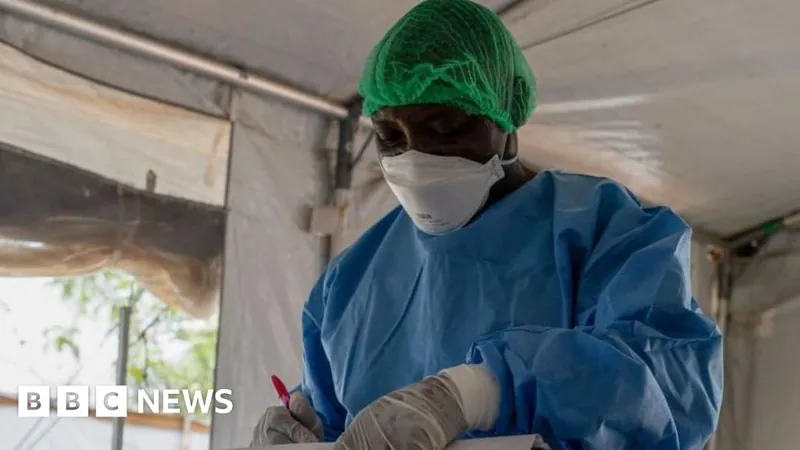
Shocking Statistics: One in Six People in Türkiye Affected by Debilitating Migraines!
2024-12-23
Author: Charlotte
Introduction to the Migraine Crisis in Türkiye
Migraine, a chronic neurological disorder, is impacting millions globally, with a shocking 13.1 million individuals in Türkiye suffering from it. Neurology expert Professor Dr. Gülsen Kocaman from Medical Park Bahçelievler Hospital revealed striking insights that highlight the widespread and often underestimated impact of this condition.
Prevalence and Demographics
In a nation of approximately 85 million, this statistic translates to an astonishing one in every six people affected! The gender disparity is alarming, as women are three times more likely to suffer from migraines compared to men. Dr. Kocaman mentions that around one in five women, one in 16 men, and one in 11 children in Türkiye are diagnosed with this agonizing condition.
Understanding Migraine Symptoms
Characterized by intense, throbbing headaches, migraines come with a host of distressing symptoms like nausea, vomiting, and heightened sensitivity to light and sound. These debilitating episodes can last from four to 72 hours if not effectively managed. The repercussions are significant, as migraines disrupt daily activities across family, work, and social spheres. Dr. Kocaman is clear: the physical pain is just the tip of the iceberg, as the condition profoundly diminishes overall quality of life—emphasizing the immediate need for early diagnosis and appropriate treatment.
Global Perspective on Migraine
Globally, migraine ranks as one of the most common neurological disorders and is a leading cause of disability. Dr. Kocaman highlighted alarming statistics, revealing that approximately 13.1 million individuals in Türkiye are grappling with migraines, underscoring the condition's prevalence and its impact, which is decidedly greater among women.
Underdiagnosis and Seeking Treatment
"Migraine is a leading cause of disability worldwide, leading to a marked erosion of quality of life for sufferers," Dr. Kocaman asserted. Disturbingly, she noted that this condition often remains underdiagnosed in Türkiye, with only about 40% of migraine sufferers seeking professional assistance. This means many people endure a life of pain without realizing that their condition can be effectively managed.
Causes and Triggers of Migraines
The exact cause of migraines continues to elude researchers. However, Dr. Kocaman points to a complex interplay of genetic and environmental factors, with triggers ranging from stress, fatigue, and irregular sleep patterns to dehydration and hormonal changes. Environmental stressors like bright lights, weather changes, certain foods (including beloved items like chocolate and citrus), as well as air pollution and smoking, can exacerbate the condition. Identifying and avoiding these triggers is crucial for migraine management.
Diagnosis of Migraine
Diagnosis typically hinges on symptoms reported by patients, including headache nature, accompanying symptoms, and the frequency of episodes. While neurological examinations and imaging tests like MRIs or CT scans usually appear normal for migraine sufferers, these are sometimes essential to rule out more severe issues like tumors or infections.
Psychological Effects of Migraines
In addition to the physical toll, the psychological effects of migraines are often overlooked. Dr. Kocaman emphasized that migraines can lead to significant social isolation and a steep decline in quality of life, especially during severe episodes. "Patients may struggle to partake in daily tasks or maintain their social and work engagements during an attack," she noted. Addressing these psychological dimensions is vital for patient support and coping strategies.
Managing Migraines Alongside Other Health Issues
Moreover, Dr. Kocaman alerted patients to be mindful of other health conditions that could aggravate migraines. Issues like smoking, high cholesterol, hypertension, diabetes, and the use of birth control pills heighten the risk of vascular complications, necessitating a comprehensive approach to managing migraines alongside these other health concerns.
Conclusion: Confronting the Migraine Crisis
As Türkiye confronts the migraine crisis, increased awareness, early intervention, and holistic treatment strategies are essential to improve the lives of those affected. Could this be a silent epidemic? One thing is for sure: it’s time to take migraines seriously!









 Brasil (PT)
Brasil (PT)
 Canada (EN)
Canada (EN)
 Chile (ES)
Chile (ES)
 España (ES)
España (ES)
 France (FR)
France (FR)
 Hong Kong (EN)
Hong Kong (EN)
 Italia (IT)
Italia (IT)
 日本 (JA)
日本 (JA)
 Magyarország (HU)
Magyarország (HU)
 Norge (NO)
Norge (NO)
 Polska (PL)
Polska (PL)
 Schweiz (DE)
Schweiz (DE)
 Singapore (EN)
Singapore (EN)
 Sverige (SV)
Sverige (SV)
 Suomi (FI)
Suomi (FI)
 Türkiye (TR)
Türkiye (TR)